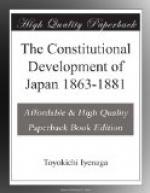“The officials (of the Shogun), however, argued otherwise and said: ’If we try to drive them away they will immediately commence hostilities, and then we shall be obliged to fight. If we once get into a dispute we shall have an enemy to fight who will not be easily disposed of. He does not care how long a time he must spend over it, but he will come with myriads of men-of-war and surround our shores completely; he will capture our junks and blockade our ports, and deprive us of all hope of protecting our coasts. However large a number of ships we might destroy, he is so accustomed to that sort of thing that he would not care in the least. Even supposing that our troops were animated by patriotic zeal in the commencement of the war, after they had been fighting for several years their patriotic zeal would naturally become relaxed, the soldiers would become fatigued, and for this we should have to thank ourselves. Soldiers who have distinguished themselves are rewarded by grants of land, or else you attack and seize the enemy’s territory and that becomes your own property; so every man is encouraged to fight his best. But in a war with foreign countries a man may undergo hardships for years, may fight as if his life were worth nothing, and, as all the land in this country already has owners, there will be none to be given away as rewards; so we shall have to give rewards in words or money. In time the country would be put to an immense expense and the people be plunged into misery. Rather than allow this, as we are not the equals of foreigners in the mechanical arts, let us have intercourse with foreign countries, learn their drill and tactics, and when we have made the nation as united as one family, we shall be able to go abroad and give lands in foreign countries to those who have distinguished themselves in battle. The soldiers will vie with one another in displaying their intrepidity, and it will not be too late then to declare war. Now we shall have to defend ourselves against these foreign enemies, skilled in the use of mechanical appliances, with our soldiers whose military skill has considerably diminished during a long peace of three hundred years, and we certainly could not feel sure of victory, especially in a naval war.’"[5]
The Kai-Koku party, the party in favor of opening the country, triumphed, and the treaty was finally concluded between the United States and Japan on the 31st of March, 1854. After the return of Commodore Perry to America, Townsend Harris was sent by the United States Government as Consul-General to Japan. He negotiated the commercial treaty between the United States and Japan on July 29, 1858.
At the heels of the Americans followed the English, French, Russians, Dutch, and other nations. Japan’s foreign relations became more and more complicated and therefore difficult to manage.




